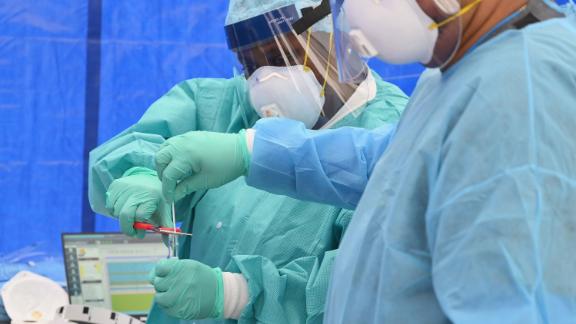Abbott’s fast Covid-19 test may miss too many cases, NYU study finds

A new study suggests that the Covid-19 diagnostic test being used by the White House frequently misses cases of the virus.
The Abbott ID NOW test, which has been touted by President Trump on several occasions, is faster than other tests, showing results within 13 minutes.
The study authors at NYU Langone Health in New York said the Abbott test was so inaccurate that it was “unacceptable” for use with their patients.
An infectious disease expert said he thought the White House should also think about discontinuing its use of the Abbott test.
“The White House might have to call an audible and switch tests,” said Dr. Peter Hotez, a professor at Baylor University School of Medicine in Houston. “Calling an audible” is a football term when the quarterback changes the play at the last minute.
The White House has not yet released an official comment.
The NYU researchers looked at nasal swabs from 101 patients who came in for coronavirus testing, and compared the results from the Abbott test to results from another Covid-19 diagnostic test made by a company called Cepheid.
The test from Cepheid found that 31 of the 101 patients were positive. The researchers ran those same positive swabs through the Abbott test and found it got a negative result on 48% of them.
Test missed patients with symptoms
The NYU researchers called the Abbott test “unacceptable.”
“The fact that it misses positive samples on patients being admitted to the hospital with clinical picture of COVID19 makes this technology unacceptable in our clinical setting,” they wrote in the study.
The Abbott test was better for the negative samples, with a 98.5% accuracy rate, according to the NYU research.
The research was posted on the pre-print server biorxiv.org. It was not reviewed by outside scientists or published in a medical journal.
Abbott disputed the findings.
“The NYU study results are not consistent with other studies,” the company said in a statement posted on its website.
“For example, in another recent study in Washington state, out of approximately 1,000 subjects there were 23 positive for COVID-19 on a lab test and ID NOW picked up 21, demonstrating 91% sensitivity and 100% specificity. We have many questions for the study authors,” the company added.
“While no test is perfect, Abbott’s ID NOW is delivering reliable results when and where they’re needed most. The test is performing as expected by the more than 1,000+ sites using ID NOW for COVID-19.”
The Food and Drug Administration, which permitted the Abbott test under emergency use authorization in March, is also investigating.
“We are reviewing the information in this non-peer-reviewed study,” an FDA spokesperson told CNN.
The Abbott test, which takes 13 minutes at most, is quicker than most other coronavirus tests on the market. Several tests take 30 minutes to two hours, and Cepheid’s test takes 45 minutes. The FDA recently authorized the Quidel Antigen Test, which takes 15 minutes.
Trump called for daily tests
The speed of the test is why President Trump has praised it.
On May 11, he stood between two tables holding the Abbott ID NOW test and other Covid-19 test.
“What they’ve been able to do — the private sector,” he said. “This is a five- to 15-minute test, as an example — the Abbott Laboratories’ test. These tests are highly sophisticated — very quick, very good. This is things that didn’t even exist a short while ago.”
Trump has said everyone around him would now be tested daily — although he also suggested it “wasn’t a perfect art.”
Hotez said in the NYU study it was reasonable to trust the Cepheid positive results over the Abbott negative results, because the patients had symptoms of Covid-19.
Kelly Wroblewski, director of infectious disease at the Association of Public Health Laboratories, said other studies have also found accuracy issues with the Abbott tests.
Researchers at the Cleveland Clinic found that the Abbott quick test missed 15% of positive cases, while a study from Northwell Health showed it missed 12.3% of positive cases.
Wroblewski said part of the issue is that rapid tests sometimes don’t perform as well as tests that take longer to run.
“You end up sacrificing accuracy for speed,” she said.
She added that in some situations, it can be helpful that the Abbott product is fast and portable.
“The Abbott is a nice little toaster-size thing that you can carry around, and that does seem to be the most convenient one,” she said.
Abbott has said studies on its test have misused its product.
Some researchers have analyzed the Abbott test by taking specimens and storing them in what’s called a viral transport medium for a period of time before testing them.
Abbott said viral transport media could dilute samples and impact testing performance. The company says it has updated the product information with that warning.
The NYU researchers analyzed the Abbott tests with and without the use of a viral transport medium.
“Once again, a study has been conducted using ID NOW in a manner that it’s not intended to be used,” according to the company statement sent to CNN.
However, the NYU study found the Abbott test was more accurate when the specimens had been stored in a medium.
